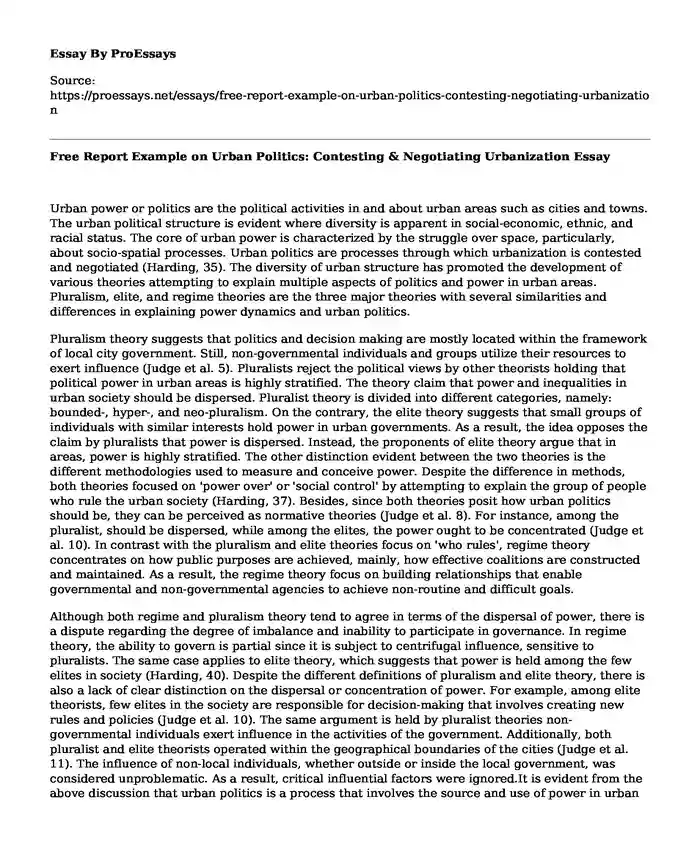Urban power or politics are the political activities in and about urban areas such as cities and towns. The urban political structure is evident where diversity is apparent in social-economic, ethnic, and racial status. The core of urban power is characterized by the struggle over space, particularly, about socio-spatial processes. Urban politics are processes through which urbanization is contested and negotiated (Harding, 35). The diversity of urban structure has promoted the development of various theories attempting to explain multiple aspects of politics and power in urban areas. Pluralism, elite, and regime theories are the three major theories with several similarities and differences in explaining power dynamics and urban politics.
Pluralism theory suggests that politics and decision making are mostly located within the framework of local city government. Still, non-governmental individuals and groups utilize their resources to exert influence (Judge et al. 5). Pluralists reject the political views by other theorists holding that political power in urban areas is highly stratified. The theory claim that power and inequalities in urban society should be dispersed. Pluralist theory is divided into different categories, namely: bounded-, hyper-, and neo-pluralism. On the contrary, the elite theory suggests that small groups of individuals with similar interests hold power in urban governments. As a result, the idea opposes the claim by pluralists that power is dispersed. Instead, the proponents of elite theory argue that in areas, power is highly stratified. The other distinction evident between the two theories is the different methodologies used to measure and conceive power. Despite the difference in methods, both theories focused on 'power over' or 'social control' by attempting to explain the group of people who rule the urban society (Harding, 37). Besides, since both theories posit how urban politics should be, they can be perceived as normative theories (Judge et al. 8). For instance, among the pluralist, should be dispersed, while among the elites, the power ought to be concentrated (Judge et al. 10). In contrast with the pluralism and elite theories focus on 'who rules', regime theory concentrates on how public purposes are achieved, mainly, how effective coalitions are constructed and maintained. As a result, the regime theory focus on building relationships that enable governmental and non-governmental agencies to achieve non-routine and difficult goals.
Although both regime and pluralism theory tend to agree in terms of the dispersal of power, there is a dispute regarding the degree of imbalance and inability to participate in governance. In regime theory, the ability to govern is partial since it is subject to centrifugal influence, sensitive to pluralists. The same case applies to elite theory, which suggests that power is held among the few elites in society (Harding, 40). Despite the different definitions of pluralism and elite theory, there is also a lack of clear distinction on the dispersal or concentration of power. For example, among elite theorists, few elites in the society are responsible for decision-making that involves creating new rules and policies (Judge et al. 10). The same argument is held by pluralist theories non-governmental individuals exert influence in the activities of the government. Additionally, both pluralist and elite theorists operated within the geographical boundaries of the cities (Judge et al. 11). The influence of non-local individuals, whether outside or inside the local government, was considered unproblematic. As a result, critical influential factors were ignored.It is evident from the above discussion that urban politics is a process that involves the source and use of power in urban areas. Three main theories explain the sources of power in urban politics. Pluralist theory holds that power is dispersed, while elite theory argues that power is stratified in urban areas. On the contrary, regime theory provides a definitive explanation by focusing on using power to achieve public goals.
Works Cited
Harding, Alan. "Elite theory and growth machines." Theories of urban politics (1995): 35-53.
Judge, David et al. eds. Theories of urban politics. Sage, 1995.
Cite this page
Free Report Example on Urban Politics: Contesting & Negotiating Urbanization. (2023, Nov 23). Retrieved from https://proessays.net/essays/free-report-example-on-urban-politics-contesting-negotiating-urbanization
If you are the original author of this essay and no longer wish to have it published on the ProEssays website, please click below to request its removal:
- A Claim of Policy: Electric Cars Essay
- Case Study With Multicultural Child: The Relational Theory and Existential Therapy
- Separation of Illegal Families Annotated Bibliography
- Should Citizens be Required to Pass a Voter-Competency Before Casting Their Ballot?
- Essay Example on DRC Soldiers' Hostility and Corruption: Inhumane Acts
- Essay Sample on Creating a Local Government on a Privately-Owned Island
- Essay Example on Multiemployer Pension Reform Act of 2014: Pension Reduction Benefits







